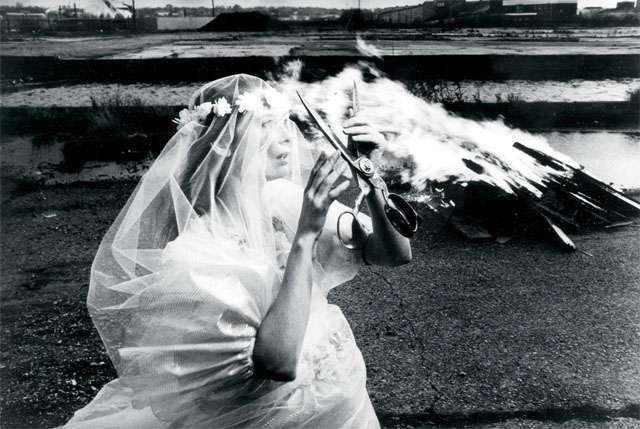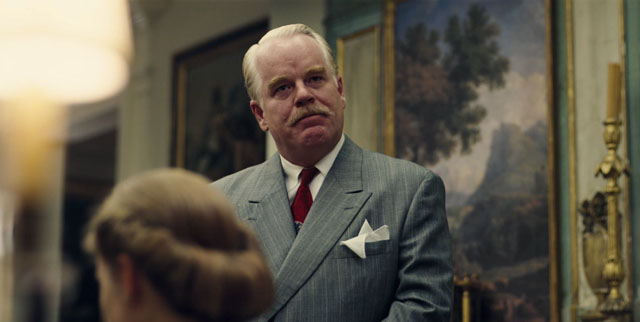If you tuned out over this late summer weekend, more power to you. There are, though, a few things you need to be aware of as you start the new week.
Catherine Grant‘s flagged a new issue of Film-Philosophy featuring, besides “dozens of book reviews,” two essays on Michael Haneke (by James J. Pearson and Lisa Coulthard), Douglas Morrey on “Jacques Rivette‘s Film Theory and Film Practice,” Daniele Rugo on John Cassavetes, Chad Trevitte on “Perversity and Post-Marxian Thought in Buñuel‘s Late Films,” Kieran Anthony Cashell on Derek Jarman‘s Wittgenstein, and much more. Speaking of Jarman, though, “Kino Classics has just released The Last of England on DVD and Blu-ray,” notes Dennis Lim in the Los Angeles Times, “and is also issuing Blu-ray editions of two early Jarman works: his first film, Sebastiane, (1976), an erotic account of the martyrdom of Saint Sebastian, and his relatively faithful Shakespeare adaptation The Tempest (1979).” The Last of England, Dennis argues, is “one of his most deeply personal films” as well as “one of his most fiercely political.”
In other news. On Friday night, Paul Thomas Anderson slipped the first public screening of The Master (trailer), headed to both Venice and Toronto, into the Aero Theater in Santa Monica. “It’s a pretty great way of letting the film get its time in the festival sun and yet still zag where some expected it to zig, and we wonder if similar secret screenings might take place in the run up to the film’s opening date on September 14th,” writes Oliver Lyttelton at the Playlist, where he gathers a few initial reactions, most of them tweets, none of them spoilers, all of them pretty happy at the very least (a few are nearly ecstatic). Beth Hanna‘s followed up with a 6.5-paragraph review at Thompson on Hollywood, and there may be more in there than you’ll want to know at this point.
Books. Meantime, Jason Sperb has just sent off an almost-final draft of his forthcoming book, Blossoms and Blood / Postmodern Media Culture and the Films of Paul Thomas Anderson. Like his book on Disney’s Song of the South, it’ll be published by the University of Texas Press, which is leaving a window open for him to add an afterward on The Master just before it goes to print. At any rate, PTA fans, he’s got the TOC and notes on how this book came about at his blog, Jamais Vu.
“There are more ways of writing about Hollywood than you’d think one dream city, one microcosm, could hold,” writes Stephanie Zacharek in Slate. Michael Tolkin’s The Player, “acerbic and spot-on, nails ’80s Hollywood excess like no other novel. Other works, like Steve Erickson’s Zeroville, or the twin novels of John Kaye, Stars Screaming and The Dead Circus, are sturdily poetic.” Bruce Wagner’s Dead Stars, however, is “a gassy ramble of a novel that goes so far over the top it bends itself right back down to the bottom.” Carolyn Kellogg, on the other hand, reviewing the novel for the Los Angeles Times, finds it to be “a manic, hypersexualized take-down of Hollywood wannabes and strivers, a relentless, wickedly funny, pornographic flash on the eddies of fame in the present moment.”
More reading. Also in Slate, Tom Shone argues that we’re seeing fewer films about America and Americans because studios and independent filmmakers alike are simply following the money—abroad.
NISI MASA, the network of young professionals, students and enthusiasts passionate about European cinema, has two new issues of Mas y Mas out, one on “The 3D Era,” the other entitled “Low, Micro, Zero.”
Viewing. The trailer for Ry Russo-Young’s Nobody Walks, co-written with Lena Dunham and featuring John Krasinski, Olivia Thirlby, Rosemarie DeWitt, Justin Kirk, India Ennenga, and Dylan McDermott:
Obits. “Chavela Vargas, who defied gender stereotypes to become one of the most legendary singers in Mexico, died Sunday at age 93,” reports the AP. “Vargas rose to fame flouting the Roman Catholic country’s preconceptions of what it meant to be a female singer: singing lusty ‘ranchera’ songs while wearing men’s clothes, carrying a pistol, drinking heavily and smoking cigars…. She was a friend and a frequent house guest of the Mexican painters Frida Kahlo and Diego Rivera and was close to the Spanish writer Federico Garcia Lorca…. She appeared in the 2002 film Frida, about her old friend, singing the eerie song ‘La Llorona,’ or ‘The Crier,’ in a hoarse but haunting voice [clip]. ‘I don’t think there is a stage big enough in this world for Chavela,’ wrote the Spanish director Pedro Almodóvar, who featured her music in many of his films.”
David Simon, who created The Wire with Ed Burns, remembers the inspiration of the book he and Burns wrote together in 1997, The Corner: “The price of being a white man on Fayette Street and getting to know DeAndre McCullough was to have your from-the-other-America pontifications pulled and scalpeled apart by a manchild with an uncanny ear for hypocrisy and cant.”
Ingeborg Westphal was primarily known in Germany for her television work, but she also appeared in Oskar Roehler’s The Elementary Particles (2006), Dominik Graf’s The Red Cockatoo (2006), and Wolfgang Becker’s Life Is All You Get (1997). Her death on July 28 was kept quiet for a week and her exact birthdate is still a secret, though, as the Süddeutsche Zeitung notes, she was born in 1951.
More late summer browsing? The Film Doctor has a fine new roundup.
For news and tips throughout the day every day, follow @KeyframeDaily on Twitter and/or the RSS feed. Get Keyframe Daily in your inbox by signing in at fandor.com/daily.





